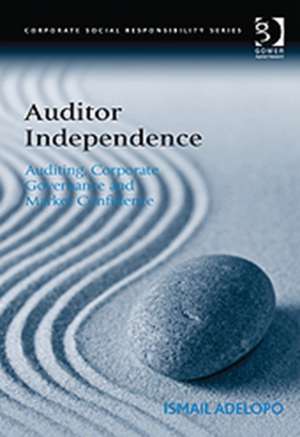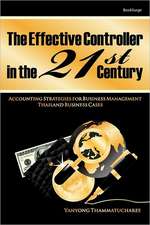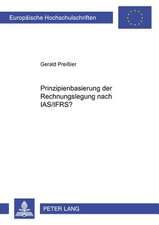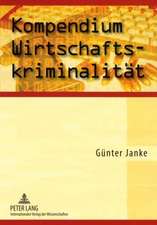Auditor Independence: Auditing, Corporate Governance and Market Confidence: Corporate Social Responsibility
Autor Ismail Adelopoen Limba Engleză Hardback – 13 dec 2012
| Toate formatele și edițiile | Preț | Express |
|---|---|---|
| Paperback (1) | 259.72 lei 6-8 săpt. | |
| Taylor & Francis – 14 oct 2024 | 259.72 lei 6-8 săpt. | |
| Hardback (1) | 851.56 lei 6-8 săpt. | |
| Taylor & Francis – 13 dec 2012 | 851.56 lei 6-8 săpt. |
Din seria Corporate Social Responsibility
- 24%
 Preț: 208.79 lei
Preț: 208.79 lei - 25%
 Preț: 768.30 lei
Preț: 768.30 lei - 15%
 Preț: 669.94 lei
Preț: 669.94 lei - 30%
 Preț: 770.98 lei
Preț: 770.98 lei - 18%
 Preț: 1112.83 lei
Preț: 1112.83 lei - 23%
 Preț: 233.51 lei
Preț: 233.51 lei - 25%
 Preț: 499.77 lei
Preț: 499.77 lei - 14%
 Preț: 326.96 lei
Preț: 326.96 lei - 16%
 Preț: 238.48 lei
Preț: 238.48 lei - 15%
 Preț: 259.51 lei
Preț: 259.51 lei - 16%
 Preț: 244.73 lei
Preț: 244.73 lei - 12%
 Preț: 299.52 lei
Preț: 299.52 lei - 14%
 Preț: 259.72 lei
Preț: 259.72 lei -
 Preț: 469.34 lei
Preț: 469.34 lei -
 Preț: 311.73 lei
Preț: 311.73 lei
Preț: 851.56 lei
Preț vechi: 1218.07 lei
-30% Nou
Puncte Express: 1277
Preț estimativ în valută:
162.94€ • 170.14$ • 134.55£
162.94€ • 170.14$ • 134.55£
Carte tipărită la comandă
Livrare economică 15-29 aprilie
Preluare comenzi: 021 569.72.76
Specificații
ISBN-13: 9781409434702
ISBN-10: 1409434702
Pagini: 248
Dimensiuni: 174 x 246 mm
Greutate: 0.67 kg
Ediția:1
Editura: Taylor & Francis
Colecția Routledge
Seria Corporate Social Responsibility
Locul publicării:Oxford, United Kingdom
ISBN-10: 1409434702
Pagini: 248
Dimensiuni: 174 x 246 mm
Greutate: 0.67 kg
Ediția:1
Editura: Taylor & Francis
Colecția Routledge
Seria Corporate Social Responsibility
Locul publicării:Oxford, United Kingdom
Recenzii
’A valuable, original contribution to our understanding of the association between, and the value of, auditing and corporate governance including the role of audit committees. Based on empirical research and very well sourced, this is attractively written and easy to read. Vital reading for directors and regulators and students of corporate governance and auditing, and a "must" for my own students. Highly recommended.’ Andrew D. Chambers, Professor Emeritus, Cass Business School
Notă biografică
Ismail Adelopo is a Senior Lecturer in Accounting and Finance in the Department of Accounting and Finance at Leicester Business School, part of De Montfort University in the UK. He teaches auditing, corporate governance and financial reporting at different levels, including to post graduate and professional level students. Dr Adelopo holds a PhD from De Montfort University and he is a Fellow of the Association of Chartered Certified Accountants. He is also a member of a number of accounting associations including the British Accounting Association, the European Accounting Association, and the Management Control Association.
Cuprins
Chapter 1 Corporate Misbehaviour and Corporate Governance; Chapter 2 Defining Corporate Governance – The Background; Chapter 3 Regulation and Auditing – Ethics and Professionalism; Chapter 4 Theory and Corporate Phenomena – Concepts and Frameworks; Chapter 5 Audit Committees and Auditor Independence – The Research Evidence; Chapter 6 Governance and Auditing – Theory, Practice, Policy and Research;
Descriere
Auditors' independence has been called into question in the light of their being complicit in some of the corporate misbehaviour exposed in recent years. Here, the author examines the historical role of auditing in corporate governance and the regulatory context. He sets the function within a theoretical framework and then provides empirical analysis of problem issues such as the relationship between audit committees and external auditors and the probity of providing non-auditing services to audit clients. The focus on matters that are damaging to market confidence and threatening to the reputation of the auditing profession, means the conclusions and recommendations in this book are important for key stakeholders, including policy makers, regulators, those running companies, and their investors and customers. This is also a book for those responsible for training in the auditing profession and for others with a research or academic interest in the matters addressed.










